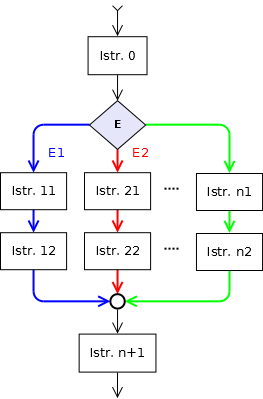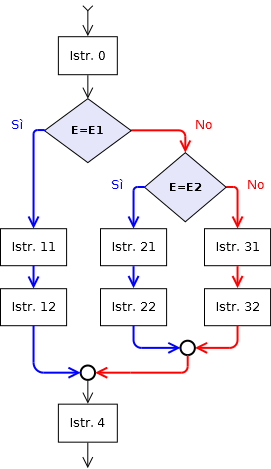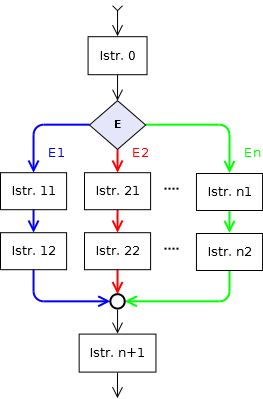Decidere quale eseguire tra tante sequenze alternative di istruzioni

Dopo aver eseguito Istruzione 0 decide quale blocco eseguire in funzione del valore assunto dall’espressione E:
Se E = E1 esegue
- Istruzione 11
- Istruzione 12
- …
altrimenti se E = E2 esegue
- Istruzione 21
- Istruzione 22
- …
…
altrimenti esegue
- Istruzione n1
- Istruzione n2
e poi continua eseguendo Istruzione n+1.
Il valore assunto dell’unica espressione E decide quale blocco verrà eseguito.
Un solo blocco sarà eseguito in esclusiva.
Non è necessario introdurre un costrutto di controllo a più uscite perché il diagramma di flusso si può trasformare nel successivo (esempio con 3 scelte…) dove cambia l’interpretazione ma non il comportamento dell’algoritmo.

Dopo aver eseguito Istruzione 0 decide se eseguire
- Istruzione 11
- Istruzione 12
oppure continua e quindi decide se eseguire
- Istruzione 21
- Istruzione 21
oppure
- Istruzione 31
- Istruzione 32
e quindi continua eseguendo Istruzione 4.
Prima del No finale possono essere inseriti ulteriori blocchi di tipo selezione doppia (con E3, E4, …).
C, C++, Java, …
if(E == E1)
{
istr11;
istr12;
}
else
{
// ...
}
if(E == E1)
{
istr11;
istr12;
}
else
{
if(E == E2)
{
istr21;
istr22;
}
else
{
istr31;
istr32;
}
}
if(E == E1)
{
istr11;
istr12;
}
else if(E == E2)
{
istr21;
istr22;
}
...
...
else
{
istrn1;
istrn2;
}
if(E == E1)
istr1;
else if(E == E2)
istr2;
...
...
else
istrn;
Pascal
If E = E1 Then
Begin
Istr_11;
Istr_12;
End
Else
Begin
(* ... *)
End;
If E = E1 Then
Begin
Istr11;
Istr12;
End
Else
Begin
If E = E2 Then
Begin
Istr21;
Istr22;
End
Else
Begin
Istr31;
Istr32;
End
End;
If E = E1 Then
Begin
Istr11;
Istr12;
End
Else If E = E2 Then
Begin
Istr21;
Istr22;
End
...
...
Else
Begin
Istrn1;
Istrn2;
End;
If E = E1 Then
Istr1
Else If E = E2 Then
Istr2
...
...
Else
Istrn;
Python
if E == E1:
Istr_11
Istr_12
else:
pass
if E == E1
istr11
istr12
else:
if E == E2:
istr21
istr22
else:
istr31
istr32
if E == E1:
istr11
istr12
elif E == E2:
istr21
istr22
...
...
else:
istrn1
istrn2
if E == E1:
istr11
elif E == E2:
istr21
...
...
else:
istrn1
Small Basic
If E = E1 Then
Istr11
Istr12
Else
' ...
EndIf
If E = E1 Then
Istr11
Istr12
Else
If E = E2 Then
Istr21
Istr22
Else
Istr31
Istr32
EndIf
EndIf
If E = E1 Then
Istr11
Istr12
ElseIf E = E2 Then
Istr21
Istr22
...
...
Else
Istrn1
Istrn2
EndIf
If E = E1 Then
Istr1
ElseIf E = E2 Then
Istr2
...
...
Else
Istrn
EndIf
Visual Basic
If E = E1 Then
Istr_11
Istr_12
Else
' ...
End If
If E = E1 Then
Istr11
Istr12
Else
If E = E2 Then
Istr21
Istr22
Else
Istr31
Istr32
End If
End If
If E = E1 Then
Istr11
Istr12
ElseIf E = E2 Then
Istr21
Istr22
...
...
Else
Istrn1
Istrn2
End If
If E = E1 Then
Istr1
ElseIf E = E2 Then
Istr2
...
...
Else
Istrn
End If
Else facoltativo
Se è prevista anche l’eventualità che nessun blocco venga eseguito allora il controllo del valore di E avverrà fino alla fine e non comparirà l’Else finale

C, C++, Java, ..
if(E == E1)
{
istr_11;
istr_12;
}
else
{
if(E == E2)
{
istr21;
istr22;
}
}
if(E == E1)
{
istr11;
istr12;
}
else if(E == E2)
{
istr21;
istr22;
}
...
...
else if(E == En)
{
istrn1;
istrn2;
}
if(E == E1)
istr1;
else if(E == E2)
istr2;
...
...
else if(E == En)
istrn;
Pascal
If E = E1 Then
Begin
Istr_11;
Istr_12;
End
Else
Begin
If E = E2 Then
Begin
Istr21;
Istr22;
End;
End;
If E = E1 Then
Begin
Istr11;
Istr12;
End
Else If E = E2 Then
Begin
Istr21;
Istr22;
End
...
...
Else If E = En Then
Begin
Istrn1;
Istrn2;
End;
If E = E1 Then
Istr1
Else If E = E2 Then
Istr2
...
...
Else If E = En Then
Istrn;
Python
if E == E1:
istr_11
istr_12
else:
if E == E2:
istr21
istr22
if E == E1:
istr11
istr12
elif E == E2:
istr21
istr22
...
...
elif E == En:
istrn1
istrn2
if E == E1:
istr1
elif E == E2:
istr2
...
...
elif E == En:
istrn
Small Basic
If E = E1 Then
Istr_11
Istr_12
Else
If E = E2 Then
Istr_21
Istr_22
End If
EndIf
If E = E1 Then
Istr_11
Istr_12
ElseIf E = E2 Then
Istr_21
Istr_22
EndIf
If E = E1 Then
Istr_1
ElseIf E = E2 Then
Istr_2
...
...
ElseIf E = En Then
Istr_n
EndIf
Visual Basic
If E = E1 Then
Istr_11
Istr_12
Else
If E = E2 Then
Istr_21
Istr_22
End If
End If
If E = E1 Then
Istr_11
Istr_12
ElseIf E = E2 Then
Istr_21
Istr_22
End If
If E = E1 Then
Istr_1
ElseIf E = E2 Then
Istr_2
...
...
ElseIf E = En Then
Istr_n
End If